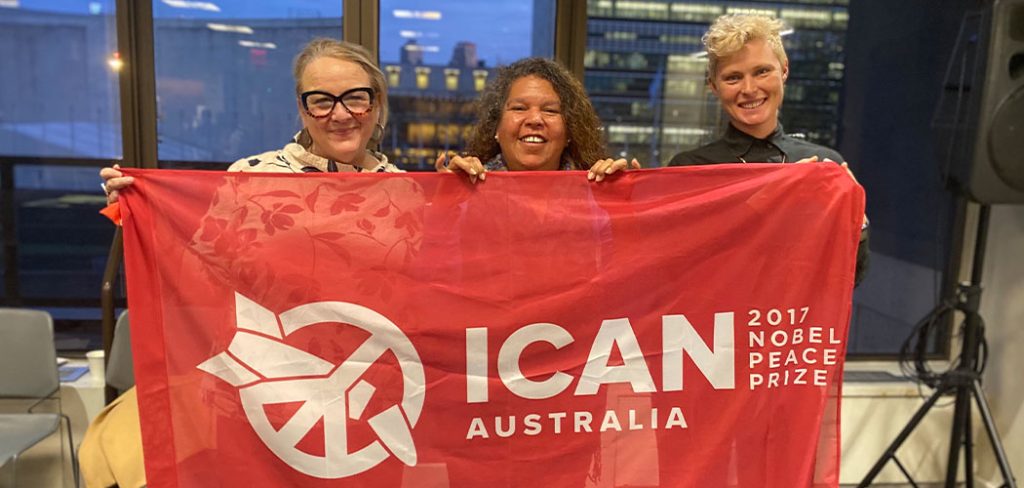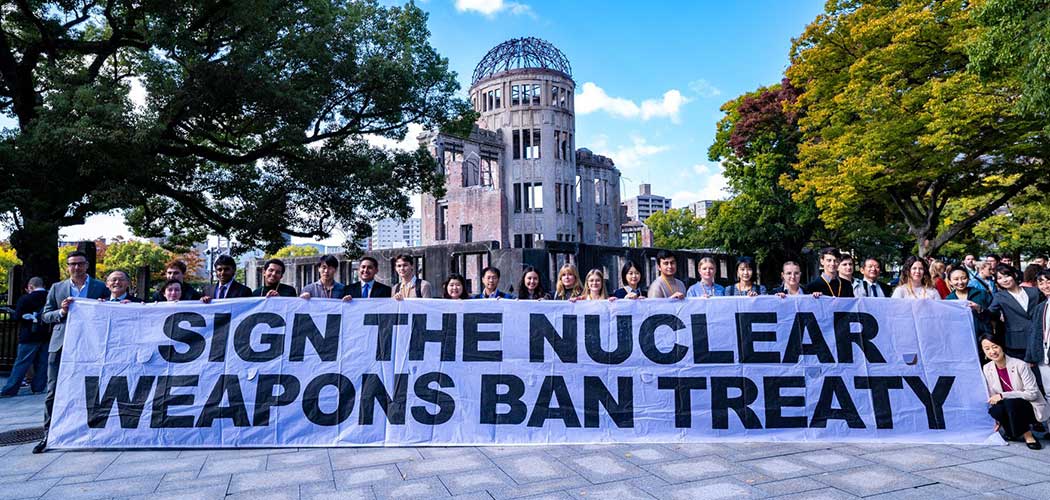“There are no safe hands for nuclear weapons,” says activist Dimity Hawkins, co-founder of the International Campaign to Abolish Nuclear Weapons (ICAN).
As the 80th anniversary of the atomic bombings of Hiroshima and Nagasaki by the United States approaches on 6 and 9 August, the leading nuclear disarmament advocate warns that amid ongoing global conflicts, the threat posed by nuclear weapons is now greater than ever.
“When that bomb was dropped on Hiroshima 80 years ago, some of the first reports that came back were from doctors or medics who were witnessing the devastation, but also some of the first warnings of the inability of frontline medical workers to effectively treat victims, then, later, the ongoing harms to survivors,” explains Dimity.
“We have to remember that from the very start of the nuclear era there have been people who are borne witness to, who have spoken against and who have advocated for the end of these weapons – and yet here we are, 80 years down the track, and we are still having these same conversations.”
ICAN’s landmark Treaty on the Prohibition of Nuclear Weapons (TPNW) was adopted by the United Nations in 2017. It marked the first legally binding Treaty to ban nuclear weapons – including possessing, producing, and testing them.
While nearly 100 countries have since signed and ratified the treaty, nine nuclear-armed states including the United States, Russia, China, the UK, and France, have not joined. Even more worrying, on top of failing to get rid of their nuclear weapons, many of these large and powerful states continue to modernise their weapons and escalate their arsenals.
Despite the Labor Party publicly committing to signing the Treaty, and strong public support, Australia, too, remains a conspicuous non-signatory.
“We really stand out in our region as a very notable gap in the map,” says Dimity.
Although the banning of nuclear weapons remains the central objective of the TPNW, Dimity says the treaty also extends to broader efforts to support victims and survivors of nuclear weapons use and testing.
It’s an area that’s deeply meaningful to her, having grown up in the Pacific during a period of extensive French nuclear testing in the region where she witnessed the “sense of powerlessness people felt”.
“For me personally, one of the things that I think has been so significant in this Treaty, is watching the dynamic shift of lived experience expertise coming forth,” she says.
“So, the survivors of nuclear harms, and the intergenerational survivors and affected community members have been able to shape so much of the discourse around why we need to get rid of these nuclear weapons. We’re seeing a lot more understanding of the real long-term impacts of nuclear weapons on their communities and the importance of never letting this happen again.”

Dimity is “staggered” Australia still hasn’t signed the Treaty, especially given the nation’s experiences with nuclear testing, including British nuclear testing in the 1950s and 1960s, and most recently, French nuclear testing in the Pacific region in 1996, which sparked widespread opposition at the time.
“Over and over again, we have heard Australian governments say that we rely on the nuclear weapons of America for our security. This is called extended nuclear deterrence, and it’s a real problem,” argues Dimity.
“It’s a myth that nuclear weapons are a deterrent, and it’s a double myth that extended nuclear deterrence would actually provide us any security.”
Her stance remains unwavering: no matter the line of reasoning “nuclear weapons are never acceptable”.
“Most international law agrees that nuclear weapons are an unacceptable weapon in this world,” she says.
“They’re disproportionate. They have long-lived effects. They are often used in places and against peoples who have no power over them.
“There’s indiscriminate impacts of these weapons, which will be felt throughout whole regions where these weapons may be used. So, there’s no reason to think that this country should be supporting any regime that supports nuclear weapons.”
As we approach the 80th anniversary of the atomic bombings of Hiroshima and Nagasaki this August, ICAN, which was awarded the Nobel Peace Prize in 2017 for its advocacy, is calling on its supporters around Australia and the wider community to urge the Albanese Government to sign the Treaty. This includes the Australian Nursing and Midwifery Federation (ANMF), a partner organisation of ICAN.
“Eight years is too long. Eighty years is more than enough. We must sign on and ban this weapon, says Dimity.
Learn more about the Treaty on the Prohibition of Nuclear Weapons (TPNW) and how you can join and support the campaign at icanw.org.au









4 Responses
Sadly Australian leaders refuse to sign the Nuclear Weapons Ban Treaty because of the alliance with the US.
I am certain that now the 2 major political parties in Australia are supporting AUKUS, our leaders will accept US submarines and naval ships carrying nuclear weapons coming into Australian ports. Anthony Albanese continues to talk about Australia’s sovereignty and doesn’t seem to be aware how contradictory he is being.
The US alliance has kept us involved in many unnecessary and immoral wars and overthrow of democratic governments instigated by the US since WW2 just because our leaders want to maintain the alliance and because they see it as the cornerstone of our defence. How many more young Australians will die during such conflicts to help maintain US hegemony?
If we really want to maintain our sovereignty, Australia needs to become a truly free, non-aligned and independent Australia that does not have foreign military, air force or naval bases. Our cousins in NZ have shown the way. It will not allow nuclear powered submarines or naval vessels carrying nuclear weapons into the country. We should be doing the same.
If we sign the Nuclear Weapons Ban Treaty and become an independent and non-aligned nation, it would also free our leaders to more sincerely and effectively to work for world peace, human rights, social justice, the international rule of law, fair dealings between nations and cooperation to resolve the environmental and health crises that humanity faces.
We might find that leaders of other nations might have greater trust in our leaders to play a more positive role in international affairs rather than doggedly follow the dictates of a major power.
And as we remember the atomic bombings of Hiroshima and Nagasaki 80years ago, we should also remember that it was a famous iconic Australian journalist – Wilfred Burchett – who first drew the world’s attention to the strange new nuclear disease that was initiated by the droppings of the atomic bomb.
He took a 30 hour train trip to Hiroshima and was the first western journalist at the scene. Personnel of the US Overseas Stragic Service (the fore-runner of the CIA) were very unhappy when they encountered him tyoing a repost in the rubble. Their role was to deny the existence of radiation sickness that Burchett was warning the world abou.
Burchett’s Morse code dispatch was printed on the front page of the Daily Express newspaper in London on 5 September 1945. Entitled “The Atomic Plague”, and with the subtitle “I Write This as a Warning to the World”. It began:
“In Hiroshima, 30 days after the first atomic bomb destroyed the city and shook the world, people are still dying, mysteriously and horribly – people who were uninjured by the cataclysm – from an unknown something which I can only describe as atomic plague. Hiroshima does not look like a bombed city. It looks as if a monster steamroller had passed over it and squashed it out of existence. I write these facts as dispassionately as I can in the hope that they will act as a warning to the world.”
Tragically, Wilfred Burchett was hated by many conservatives, but he played an important role in world affairs. Amongst other things, he helped Jews escape from the Nazi regime before WW2, acted as a go-between for the Chinese and US leaderships during WW2 and a go-between for the Vietnamese and US leaderships towards the end of the US war against Indochina and exposed the details of Chinese invasion of Vietnam after it had helped Cambodia defeat the Pol Pot regime. He was also a prolific author who wrote books about the major events of his day that were important for understanding the history of those events.
+1 for Andrews comments.
I recently wrote to the PM asking that Australia help rebuild the UN. The League of Nations was unworkable, & the major powers are rendering the UN unworkable.
-War Criminals should be prosecuted, even if the country does not recognise the ICC.
The flattening & starvation of Gaza should have been a trigger for UN intervention.
BAN NUCLEAR WEAPONRY. The Australian people don’t want more wars. The Australian people don’t want to have to rely on the U.S., especially in its current fascist, neo-Nazi state under Trump. “Oh, but if we don’t have nuclear weapons, we can’t protect ourselves in nuclear war.” If ALL nuclear weapons are banned, NO ONE will have to defend themselves against nuclear war.
We must sign the Treaty banning nuclear weapons! Australians one and all!